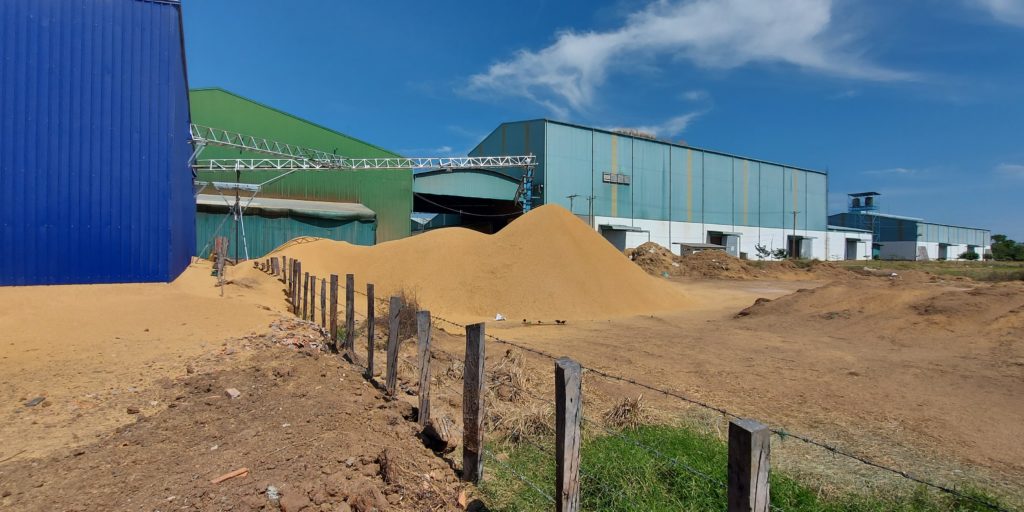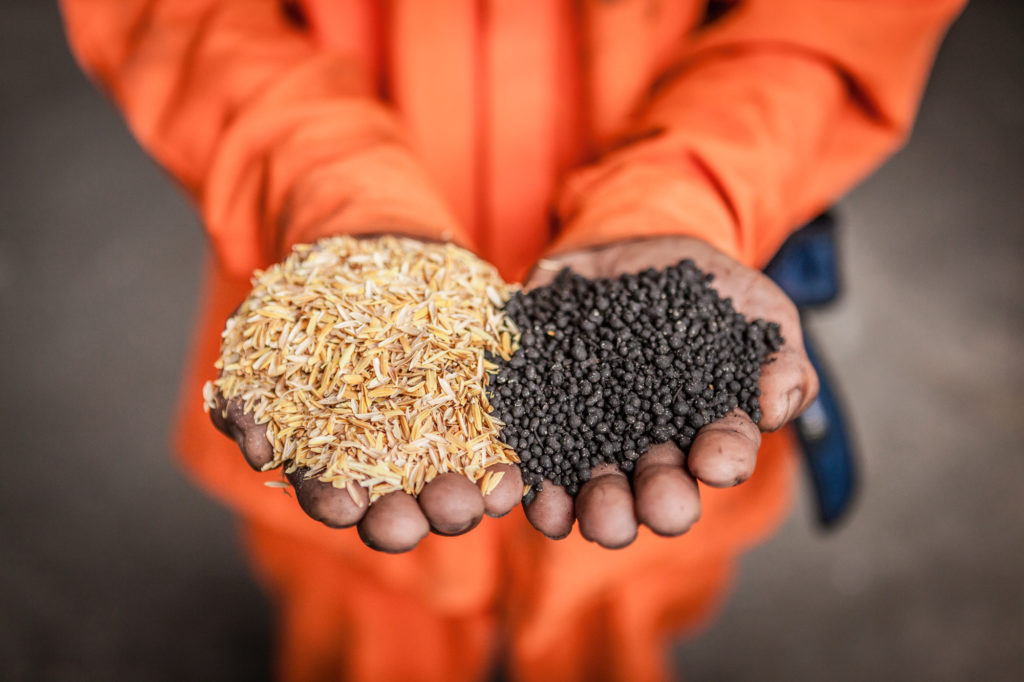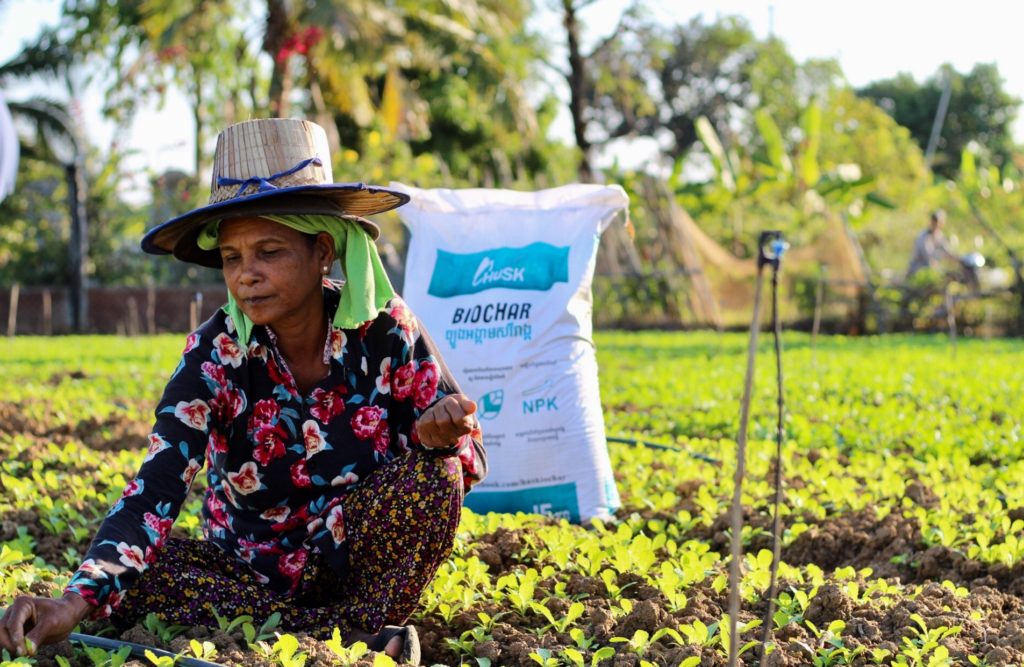Summary
| Total savings : | Approx. 3,300 ton CO₂/year |
| Technology transfer : | Advanced pyrolysis technology specifically designed to process rice husk, alongside a fertilizer production line |
| Local environment : | Long-term employment in rural communities, support of smallholder farmers with affordable organic fertilizers, soil health enhancement |
| Further advantages : | Waste management, regenerative agriculture, food security |
| Target group : | Smallholder farmers in Cambodia and Vietnam |
| Financed by : | atmosfair x HUSK |
| Local partners : | HUSK |
In partnership with HUSK, atmosfair is scaling up the production of high-quality biochar and biochar-based fertilizers in Cambodia and Vietnam. The project utilizes rice husk, an abundant feedstock in Southeast Asia, that is transformed into biochar through advanced pyrolysis technology to create long-term carbon sinks. Biochar is further processed into nutrient-rich, biochar-based fertilizers specifically formulated to meet the needs of smallholder farmers. After full implementation, the project is expected to process up to 7,000 tons of agricultural waste per year, permanently sequestering 3,300 tons of CO₂ per year in the soil. This integrated approach supports sustainable agriculture while contributing to carbon removal, enhancing soil health, and contributing to rural livelihoods in Southeast Asia.
Rice husk for climate change mitigation
In Southeast Asia, rice farming is central to rural livelihoods and plays a critical role in food security and cultural identity. However, the processing of the rice is a major source of agricultural waste, mostly from the husks, which make up 20% of the paddy’s weight. Despite being a feedstock with high potential, millions of tons of rice husks are left to decompose every year, releasing CO₂ back into the atmosphere. Therefore, developing sustainable and efficient processes that take advantage of this biomass is a waste management priority.

Biochar production
Rice plants store CO₂ through photosynthesis. When biomass is left to decompose, it releases CO₂ back into the atmosphere. In our project, rice husks are heated in the absence of oxygen in a thermochemical process called pyrolysis, which converts the biomass into biochar – a highly stable form of carbon.
Rice husk biochar is technically challenging to produce due to its high silica content. However, HUSK’s advanced technology is specifically designed for this type of biomass, ensuring the consistent production of high-quality biochar. The final product has a low hydrogen-to-organic carbon ratio, which ensures long-term carbon stability and meets the strict certification criteria of the Global Biochar C-Sink standard by Carbon Standards International (CSI). The certification process ensures the highest standards of transparency and permanence in carbon sequestration. All emissions generated throughout the value chain are rigorously accounted for and deducted from the net carbon removal, ensuring the credibility of climate claims.

Biochar-based fertilizers
Farmers in Cambodia and Vietnam have relied on the use of chemical fertilizers for many years. This led to the degradation of the soil, resulting in lower crop yields, which forces vulnerable farmers to re-apply chemical fertilizers as their livelihoods depend on the productivity of their farms. In this context, organic fertilizers appear as an imperative alternative to break this cycle.
Our rice husk biochar is further processed into innovative fertilizers. These products combine the carbon-rich structure of biochar with nutrients that deliver exactly what the soil needs. Every product is developed to meet the specific needs of local farmers in Cambodia and Vietnam, offering a competitive alternative to conventional chemical inputs. Products are constantly developed through research, collaborations and field trials. This regenerative approach helps break the cycle of soil degradation caused by chemical overuse and supports long-term food security in the region. The production is only possible with revenues from carbon credits, which subsidize costs and make the products accessible to smallholder farmers.

Expansion to Vietnam
atmosfair and HUSK are planning to extend this initiative to Vietnam. This expansion aims to replicate the successful model currently implemented in Cambodia, to support Vietnamese smallholder farmers, and further scaling permanent carbon removal in Southeast Asia. Through new partnerships and technology deployment, the project will enhance regional food security, promote sustainable farming practices, and contribute to climate goals across the Mekong Delta, the so-called “nation’s rice bowl”.
Our partner
HUSK is committed to improving the lives of smallholder farmers through regenerative agriculture and combating climate change through carbon removal. With a proven track record and deep expertise in biochar production, HUSK is a trusted partner in climate mitigation. Their strong local presence, technical know-how, and dedication to long-term impact make them uniquely equipped to implement high-quality, scalable solutions on the ground.


 Share
Share